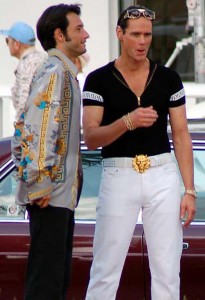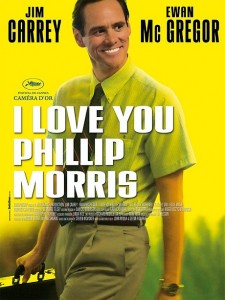Directed by Glenn Ficarra and John Requa
Screenplay by Glenn Ficarra and John Requa
2009, USA
I Love You Phillip Morris opens with a disclaimer of sorts, assuring us that “This really happened. It really did.” Such a blunt beginning not only establishes the film’s overall tone, but also serves as writer-directors Glenn Ficarra and John Requa’s license for outrageousness. There is certainly enough material in the true story of Steven Jay Russell, con artist and multiple prison escapee, to make for a riveting psychological drama. But this is not that movie. The film’s first ten minutes-where Steven, as played by Jim Carrey, narrates (in a voice as suspiciously wholesome and happy-go-lucky as that of Ned Flanders) his transition from family man/police officer to affluent gay man/con artist-play out as pure screwball dark comedy; and Ficarra and Riqua, who also co-wrote the irreverent holiday comedy Bad Santa, have no problem keeping things wonderfully warped for the film’s 100-minute run. But for all its unpredictability, what is most surprising about the film is the way it flirts with brilliance by using its stylized absurdity to mirror the mentality of what could have been an unreadable protagonist. If audiences aren’t quite sure what to make of the movie, such a response seems perfectly fitting for a film about a man whose uncanny talent for deception is inextricably linked to his inability to come to terms with his own identity.
In this sense, Jim Carrey’s casting as Steven seems less of an offbeat choice and more a logical progression of the comic  actor’s career. After multiple box-office hits and the occasional glowing review, Carrey still remains an enigma due to his tendency to take on two kinds of roles. There’s the scenery-chewing nutjob of Ace Ventura and Batman Forever, and then there’s the “Everyman” of The Truman Show and Eternal Sunshine of the Spotless Mind. If one remembers the way the latter films explored how the perceived reality/identity of even the most average of Joes can get messy, then I Love You Phillip Morris represents Carrey’s two character types meeting themselves in the middle. Steven Russell may rob people blind, but the film never presents his criminal activity as malevolent or spiteful, suggesting instead that it is a compulsion linked to his desperate need for self-actualization. Whether it’s by playing the church organ, saying his prayers before bed, buying expensive jewellery, or simply playing golf, Russell always enacts socially prescribed roles with a studied attention to detail. There is always something a little off about these personas though, and Carrey is a gifted enough actor to convey the fear and confusion lurking behind all of Russell’s façades, ultimately making him a tragic figure.
actor’s career. After multiple box-office hits and the occasional glowing review, Carrey still remains an enigma due to his tendency to take on two kinds of roles. There’s the scenery-chewing nutjob of Ace Ventura and Batman Forever, and then there’s the “Everyman” of The Truman Show and Eternal Sunshine of the Spotless Mind. If one remembers the way the latter films explored how the perceived reality/identity of even the most average of Joes can get messy, then I Love You Phillip Morris represents Carrey’s two character types meeting themselves in the middle. Steven Russell may rob people blind, but the film never presents his criminal activity as malevolent or spiteful, suggesting instead that it is a compulsion linked to his desperate need for self-actualization. Whether it’s by playing the church organ, saying his prayers before bed, buying expensive jewellery, or simply playing golf, Russell always enacts socially prescribed roles with a studied attention to detail. There is always something a little off about these personas though, and Carrey is a gifted enough actor to convey the fear and confusion lurking behind all of Russell’s façades, ultimately making him a tragic figure.
 Steven believes (or at least would have his audience believe) that his most elaborate cons are motivated by his love for Phillip Morris, whom he meets in prison and strives to lead a life of luxury with. Phillip Morris is played by Ewan McGregor as a soft-spoken, innocent slice of apple pie who is every bit as intoxicated by the idea of carefree love as Steven is, thus allowing himself to turn a blind eye when Steven all-too-perfectly makes his fantasies come true . If Carrey and McGregor’s romantic scenes together seem a bit corny at times, this is merely symptomatic of their characters’ desire for a true Hollywood love story. An exemplary scene comes when Carrey and McGregor slow dance in their cell, oblivious to the obscenities being expressed by the angry inmates around them. For Steven and Phillip, despite being behind bars, their relationship must absolutely involve beaches, private boats, Cary Grant movies, and declarations of love on opposite sides of the gate. The saturated images from cinematographer Xavier Pérez Grobet nicely convey this idyllic-despite-the-circumstances love by creating what may be the sunniest looking prison I’ve ever seen in the movies. (Canary yellow jumpsuits, anyone?)
Steven believes (or at least would have his audience believe) that his most elaborate cons are motivated by his love for Phillip Morris, whom he meets in prison and strives to lead a life of luxury with. Phillip Morris is played by Ewan McGregor as a soft-spoken, innocent slice of apple pie who is every bit as intoxicated by the idea of carefree love as Steven is, thus allowing himself to turn a blind eye when Steven all-too-perfectly makes his fantasies come true . If Carrey and McGregor’s romantic scenes together seem a bit corny at times, this is merely symptomatic of their characters’ desire for a true Hollywood love story. An exemplary scene comes when Carrey and McGregor slow dance in their cell, oblivious to the obscenities being expressed by the angry inmates around them. For Steven and Phillip, despite being behind bars, their relationship must absolutely involve beaches, private boats, Cary Grant movies, and declarations of love on opposite sides of the gate. The saturated images from cinematographer Xavier Pérez Grobet nicely convey this idyllic-despite-the-circumstances love by creating what may be the sunniest looking prison I’ve ever seen in the movies. (Canary yellow jumpsuits, anyone?)
Early on in the movie, Carrey’s naively neurotic wife (hilariously played by Leslie Mann) asks if “the gay thing and the stealing thing go hand in hand”. While ostensibly a one-liner to convey her cluelessness, there may actually be some merit to that question when applied to Steven Russell. Convinced that “being gay is really expensive”, Russell steals multiple credit cards as a means of preserving the identity he has cultivated for himself. His same-sex desires (first manifested as a childhood vision of a very phallic-looking cloud) may be genuine, but the “gay lifestyle” he adopts is just another way of satisfying his hunger for a sense of self and belonging. And while labelling the film as “a gay movie” hardly does it justice, Russell’s unapologetic and upbeat attitudes towards his homosexuality (he ecstatically declares “I’m gonna be a fag” while being treated by paramedics) only adds to its overall charm. AIDS is even brought into the story in a manner that could be labelled as distasteful were it not for the fact that it’s based on truth. Never losing sight of their primary goal to get a “WTF?”out of their audience, Ficarra and Riqua handle this climactic storyline with a pull-the-rug-from-under-your-feet cheekiness that would have scared away a less focused director.
Almost as baffling as Steven Russell himself, however, is the rather pathetic distribution I Love You Phillip Morris has  received. While the film was first shown at Sundance in 2009 (alongside some of that year’s gems such as An Education), continuous postponement due to its being dropped by the original buyer ultimately led to only a limited release in the U.S in December 2010. Montreal has fared even worse, as the film was exclusively released at Cinema du Parc just three weeks ago. Although it would be easy to attribute I Love You Phillip Morris’ distribution woes to its gay content, the fact that the film is less explicit than, say, Brokeback Mountain tends to weaken this argument. Rather, I would join the camp which speculates that the film’s offputtingly nonchalant and irreverent approach to several subjects (not just homosexuality), combined with its apparent disinterest in creating “art” (it is, after all, a comedy featuring Jim Carrey), helped lead to its condemnation as an undesirable risk. Whatever the reason though, if you thought you’d never use “Jim Carrey” and “underexposed” in the same sentence, I invite you to give this film a look.
received. While the film was first shown at Sundance in 2009 (alongside some of that year’s gems such as An Education), continuous postponement due to its being dropped by the original buyer ultimately led to only a limited release in the U.S in December 2010. Montreal has fared even worse, as the film was exclusively released at Cinema du Parc just three weeks ago. Although it would be easy to attribute I Love You Phillip Morris’ distribution woes to its gay content, the fact that the film is less explicit than, say, Brokeback Mountain tends to weaken this argument. Rather, I would join the camp which speculates that the film’s offputtingly nonchalant and irreverent approach to several subjects (not just homosexuality), combined with its apparent disinterest in creating “art” (it is, after all, a comedy featuring Jim Carrey), helped lead to its condemnation as an undesirable risk. Whatever the reason though, if you thought you’d never use “Jim Carrey” and “underexposed” in the same sentence, I invite you to give this film a look.
– Jonathan Youster






